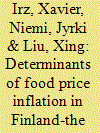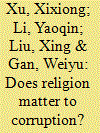|
|
|
Sort Order |
|
|
|
Items / Page
|
|
|
|
|
|
|
| Srl | Item |
| 1 |
ID:
126546


|
|
|
|
|
| Publication |
2013.
|
| Summary/Abstract |
The agricultural commodity crisis of 2006-2008 and the recent evolution of commodity markets have reignited anxieties in Finland over fast-rising food prices and food security. Little is known about the strength of the linkages between food markets and input markets, such as the energy market. Using monthly series of price indices from 1995 to 2010, we estimate a vector error-correction (VEC) model in a cointegration framework in order to investigate the short-term and long-term dynamics of food price formation. The results indicate that a statistically significant long-run equilibrium relationship exists between the prices of food and those of the main variable inputs consumed by the food chain, namely agricultural commodities, labour, and energy. When judged by the magnitude of long-run pass-through rates, farm prices represent the main determinant of food prices, followed by wages in food retail and the price of energy. The parsimonious VEC model suggests that the dynamics of food price formation are dominated by a relatively quick process of adjustment to the long-run equilibrium, the half life of the transitional dynamics being six to eight months following a shock.
|
|
|
|
|
|
|
|
|
|
|
|
|
|
|
|
| 2 |
ID:
159020


|
|
|
|
|
| Summary/Abstract |
There is a growing interest in understanding how religion affects corruption. Using provincial-level panel data from 1998 to 2009, this paper investigates the effect of religious beliefs on bureaucratic corruption in China. The empirical results show that, bureaucratic corruption is negatively associated with local religious heritage, implying that religious culture plays a positive role in restraining official's corruption since religion has influence on political preference and work ethic. We also find that the negative association between religion and corruption is weaker in provinces with stronger law enforcement, which identifies the substitution effect between religious ethic and legal supervision in curbing corruption. Our findings also reveal that, among the different religions, the anti-corruption effects of China's native religions (i.e., Taoism and Buddhism) are more significant than those of foreign religions (i.e., Christianity and Islam). These conclusions are consistent and robust to various measures of main variables and a variety of robustness checks. Given the very few studies and limited data resources in the context of China, this paper as a tentative study provides new evidences of the relationship between religion and corruption.
|
|
|
|
|
|
|
|
|
|
|
|
|
|
|
|
|
|
|
|
|